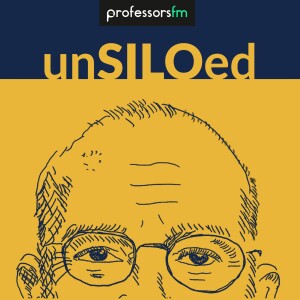
199. At What Point Does Something Become Fake? feat. Lydia Pyne
 2022-10-17
2022-10-17
Lydia Pyne’s work may loosely be called history, but it's really a combination of the sciences and the humanities. It's a reflection on how we make sense of ourselves and our past.
Lydia is a writer and historian, interested in the history of science and material culture. She has degrees in history and anthropology and a PhD in biology (history and philosophy of science) from Arizona State University. Her field and archival work has ranged from South Africa, Ethiopia, and Uzbekistan, as well as the American Southwest.
She is currently a visiting researcher at the Institute for Historical Studies at the University of Texas at Austin, and her books include “Endlings: Fables for the Anthropocene” and “Genuine Fakes: How Phony Things Teach Us About Real Stuff.”
She shares with Greg this episode how stories motivate us to actions, how nature documentaries need to include a few lies, categorizing museums, fake artifacts & art, and how the element of time can make us rethink authenticity and change.
Episode Quotes:How material and medium play a significant role in how we respond to authenticity
26:46: It makes me wonder how much the material and the medium drive how we respond to challenges to authenticity. We have different ways and different expectations of that, where if you were to go to, say, a science museum and see a T.Rex skeleton and to sort of say, Okay, this is conveying knowledge about the past, and this is telling me things that are true, and I’m going to take this away. I think it makes a lot of sense to have. Ookay, this is a replica. This is what we fill in and our best guess. And oh, this is a cast of the actual fossil. But we wanted to be really clear, so to me, I see that there isn’t a blanket statement that we can sort of apply to all material culture, but that it varies. Our tolerance and expectations change over time and vary depending on the medium.
20:39: I love this idea that something that starts out as fake in the early parts of its life could be made authentic and could be made real given enough time.
On defining endlings
04:49: So an endling is the last known individual of a species before the species is declared extinct. And it seems like such a straightforward definition, like, nope, it's the last one. Once this one individual dies, then the species is declared extinct. But the more I try to hone in on and to think about the last of this species, the more I realize that it's very difficult to count the last of something when the category that it is the last of is so slippery, tricky, and historically contingent, to begin with.
Show Links:Recommended Resources:- Johan Beringer's lying Stones
- Beth Shapiro episode
- Lydia Pyne’s Website
- Lydia Pyne on Twitter
- Lydia Pyne on Talks at Google
- Articles on JSTOR Daily
- Articles on Glasstire
- Endlings: Fables for the Anthropocene (Forerunners: Ideas First)
- Postcards: The Rise and Fall of the World’s First Social Network
- Genuine Fakes: How Phony Things Teach Us About Real Stuff (Bloomsbury Sigma)
- Seven Skeletons: The Evolution of the World's Most Famous Human Fossils
- Bookshelf (Object Lessons)
- The Last Lost World: Ice Ages, Human Origins, and the Invention of the Pleistocene
More Episodes
Create your
podcast in
minutes
- Full-featured podcast site
- Unlimited storage and bandwidth
- Comprehensive podcast stats
- Distribute to Apple Podcasts, Spotify, and more
- Make money with your podcast
It is Free
- Privacy Policy
- Cookie Policy
- Terms of Use
- Consent Preferences
- Copyright © 2015-2024 Podbean.com






